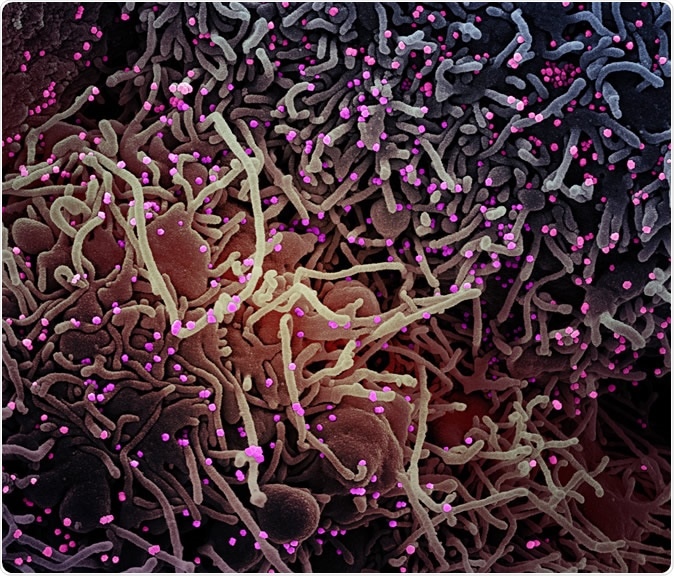The severe acute respiratory syndrome coronavirus 2 (SARS-CoV-2) usually targets older adults and those with underlying medical conditions. Past evidence has shown that the prevalence of infection among children and teens is low.
The syndrome has raised fears that COVID-19 could pose a higher risk to children than had been understood. So far, the illness has taken its highest toll on the elderly and those with underlying medical conditions.

Novel Coronavirus SARS-CoV-2 Colorized scanning electron micrograph of a VERO E6 cell (purple) exhibiting elongated cell projections and signs of apoptosis, after infection with SARS-COV-2 virus particles (pink), which were isolated from a patient sample. Image captured at the NIAID Integrated Research Facility (IRF) in Fort Detrick, Maryland. Credit: NIAID
MIS-C cases
Officially called Pediatric Multi-System Inflammatory Syndrome Potentially Associated with the COVID-19, MIS-C cases were reported in many countries such as France, Italy, the United Kingdom, the United States, South Korea, and Switzerland, among others.
Scores of children in the United States and the United Kingdom have been affected by the rare inflammatory disease, with some needing intensive care.
In the U.K., up to 100 children have been affected, while some studies have shown that the syndrome was seen in children elsewhere in Europe. Also, some children in France and Switzerland experienced an acute cardiac decompensation from the severe inflammatory state after SARS-CoV-2 infection.
In South Korea, two children are the first suspected cases of MIS-C and are now recovering following treatment.
What is multisystem inflammatory syndrome in children (MIS-C)?
Multisystem inflammatory syndrome in children (MIS-C) is a condition where various body organs become inflamed, including the lungs, heart, kidneys, skin, eyes, brain, and digestive organs, according to the U.S. Centers for Disease Control and Prevention (CDC).
The condition can be potentially deadly in some children, while most may recover with medical care. The common symptoms of the illness are similar to Kawasaki disease, a condition that causes inflammation or swelling and redness in blood vessels throughout the body. The symptoms of MIS-C include fever, vomiting, diarrhea, abdominal pain, neck pain, bloodshot eyes, rashes, and fatigue.
Severe symptoms that may warrant admission to intensive care include shortness of breath, confusion, inability to stay awake, bluish lips or face, severe abdominal pain, and pressure or pain in the chest that does not go away.
What causes multisystem inflammatory syndrome in children?
Currently, there is still no explanation of what causes MIS-C in children with coronavirus disease. However, though it is life-threatening, only a small proportion of children develop it.
The illness has been tied to two inflammatory syndromes, the Kawasaki disease, and toxic shock syndrome. Kawasaki disease is an inflammatory illness of unknown cause that affects children below 5 years old. Meanwhile, toxic shock syndrome is a complication that emerges from a bacterial infection and causes inflammation.
Toxic shock syndrome is deadlier than Kawasaki disease, but both conditions share some symptoms with MIS-C, including fever, red eyes, body pains, and rashes.
Doctors suspect that MIS-C is caused by a delayed immune response to the coronavirus. The immune response goes overdrive and causes inflammation throughout the body, a condition called “cytokine storm.”
Cytokines are small proteins produced by many different cells in the body, including those of the immune system. In some cases, the immune response may go overdrive and release uncontrolled levels of cytokines, which can activate more immune cells.
As a result, hyperinflammation happens and can seriously harm the patient. Some patients may experience inflammation throughout the body, affecting the vital organs, such as the heart, brain, lungs, and kidneys. If it is not treated promptly, it can lead to life-threatening consequences.
The CDC is still investigating the rare disease and will inform parents and caregivers. For now, it recommends that children should take precautions to prevent infection.
“CDC has a team dedicated to investigate MIS-C and gather and communicate information quickly to healthcare providers, parents, and caregivers, as well as state and local health departments. The team is working with U.S. and international scientists, healthcare providers, and other partners to learn more about this new syndrome. They are learning about how often it happens and who is likely to get it, creating a system to track cases, and providing guidance to parents and healthcare providers,” the CDC said.
Media Briefing: Multisystem Inflammatory Syndrome in Children (MIS-C)
Sources:
Journal reference: